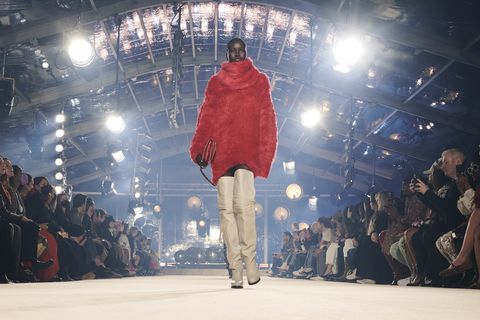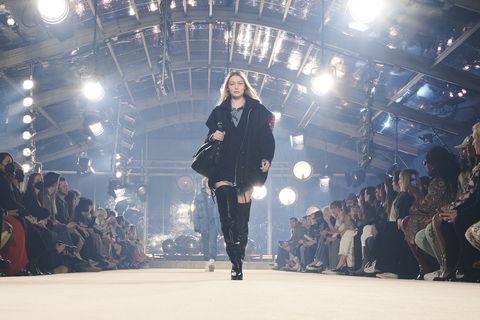The vibes are off in Paris, at least according to the city’s high priestess Isabel Marant.
“The summer was quite joyful,” she says. “But soon, it will be not so joyful. There’s a feeling that people will struggle with the rising prices of electricity and gas and restrictions [on fuel use] happening. I’m not sure it’s going to be a very peaceful winter.”
Another industry leader—someone who’s more of a showman than a badass—might segue here into the healing power of fashion, and the urgency of an upcoming runway show. But when I ask how the style community can meet this moment of unrest, Marant is smart enough to keep her viewpoint as sharp as her spike heels. “The most important thing we can do is manage our consumption,” she notes. “And isn’t that a funny thing to say in the middle of a store?”
The store in question—Marant’s second New York City boutique, which officially opens on Madison Avenue this week—is a pretty great one. It is lined with wood in the same shade of blonde as Marant muse Rianne Van Rompaey, and stocked with eternal bestsellers like Knives Out sweaters and black cowboy boots, along with some newer hits like hot pink sunglasses and sequined leggings. “It’s very exciting to be here because, no matter how big you get, it feels like such an achievement to have a location in New York City. It means you have made it. It means we speak not just to French girls—we are speaking to everyone.”
Of course, “speaking French Girl” is kind of Marant’s M.O. The lifelong Parisian began her career as a teen seamstress before doing stints at French institutions like Chloé and Martine Sitbon. Her eponymous line launched in 1994 and gained steady industry traction—design awards, crowded catwalks, knockoffs from cheaper brands—along with a steady stream of “it” fans like Anja Rubik and Halle Berry, who catapulted her boho coolness into the mainstream. “I realized what one person could do for my clothes because of Kate Moss,” she says. “She wore my sweater and the sweater gets huge—everybody wants it. We can’t keep it in stock, and it’s just this super normal sweater! But when Kate Moss wears it, it does make a difference.”
Fashion is about joy.”
—Isabel Marant
When I confess to Marant that in my 20s, I too bought that sweater, she answers with a confession of her own: “I thought [the sweater craze] was a bit stupid at first,” she admits. “But the more I thought about it, the more I realized, there are a lot of women who are not so confident, or not so natural in how they style themselves. So if Kate Moss—or Hailey Bieber, now Hailey Bieber has that effect with our clothes, too—if they can influence women to feel like they are amazing girls, I think that is fantastic, because fashion is about joy.”
Fashion is also about acquisition, but Marant is thrilled if you buy her stuff secondhand. (You can nab a pair of her famous wedge sneakers for less than $100 on The RealReal.) “I think resale is really great, very smart…[shopping] provides a lot of happiness, and I totally understand it, but you don’t need it new. I’m always more excited by getting into a vintage shop.” That said, some fabric innovations are a whole new thing, including a pair of coated silk pants that look and move like leather, but feel considerably lighter and eschew the liquid plastic gore of more common “vegan” swaps. “We know fashion needs to build things that last, and things that are made the smart way,” she says. “Otherwise, it’s just a lot of bullshit.” (Reader, I touched these pants. They are decidedly not bullshit.)
Back in Paris, Marant has been delving into housewares, creating ceramics in her studio. “I’m obsessed with doing things by hand,” she explains. “You know, because having such a big company, I don’t have time to do things with my hands anymore. And that is what I really, really love to do. Also,” she smiles, “I’m starting to get good at it. Well, I mean, I am starting to not be so bad.”
Marant has to get ready for her store’s opening dinner-slash-rave with Blackstreet, Stretch Armstrong, and 40 percent of the Queer Eye cast, along with a steady stream of American models like Carolyn Murphy, Lily Aldridge, and Hari Nef. “Style is more universal now, of course,” she says, “But also, French style, it does not go away. It is the idea that clothes are kept, and lived in, and laid-back, and not trying so hard. You cannot pretend to be who you are, you know? You have to find the joy in who you are, and fashion is a way we know that joy.”
“Her beauty and her brain go not together.” —William Shakespeare

